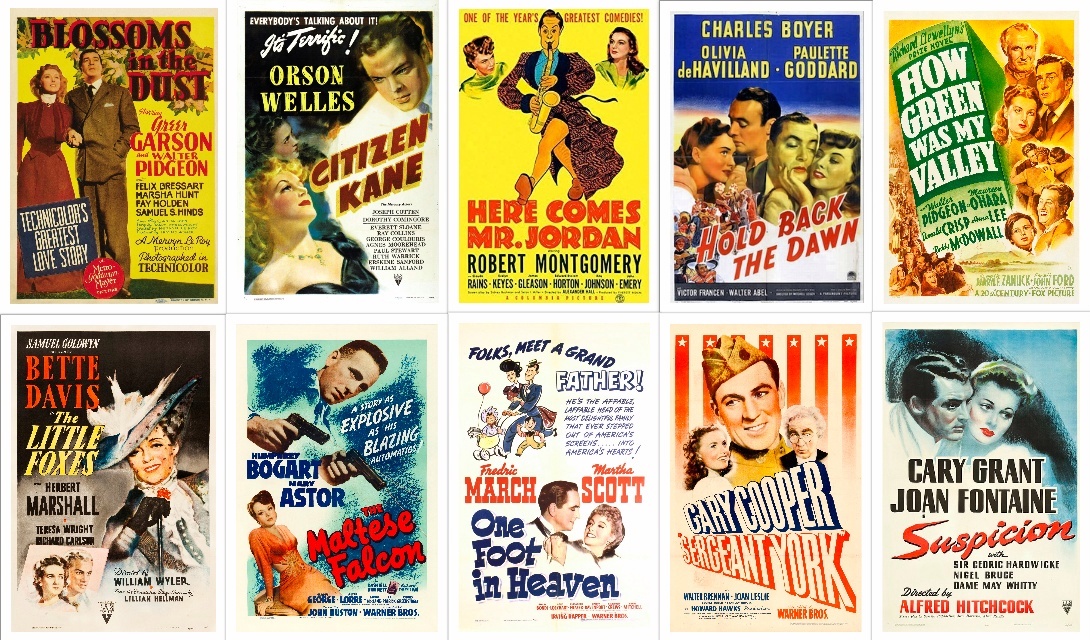Reading Eagle (February 27, 1942)
Joan Fontaine and Cooper win Oscars
Los Angeles, Feb. 27 (INS) –
Joan Fontaine and Gary Cooper today were presented Hollywood’s most coveted awards – gold-plated Oscars – for best screen performances during the past year.
How Green Was My Valley (20th Century Fox) was voted the outstanding picture of 1941.
Miss Fontaine received her award for her performance in Suspicion (RKO) and Cooper for his interpretation of the American hero, Sergeant York, in the Warner Bros. picture of the same name.
Among others, Miss Fontaine, who was nominated for an award last year, won over her actress-sister Olivia de Havilland, nominated for her performance in Hold Back the Dawn.
For the best performance by an actress in a supporting role, Mary Astor received an Oscar for her work in The Great Lie.
Donald Crisp was presented an award for the best performance by an actor in a supporting role for How Green Was My Valley.
John Fords, now a lieutenant commander in the Navy, won his third Oscar for his direction of How Green Was My Valley. Ford, on active naval duty, was not present to receive his award.
The Irving G. Thalberg Memorial Award was presented to Walt Disney, who produced the cartoon creations Fantasia and Dumbo during the year. The prize is given annually for significant contributions to the film industry.
The traditional gold statuettes were presented winners, voted by 10,000 members of the film industry, at the 14th annual Academy of Motion Picture Arts and Sciences dinner.
Ginger Rogers, 1941 winner, presented the Oscars to Miss Fontaine and Miss Astor. Lt. Jimmy Stewart award winner who left his film career for Army duty, presented the prizes to Cooper and Crisp.
Joan weeps
Winning her first Academy Award proved too much for Joan Fontaine. She wept when Miss Rogers handed her the award for best actress of the year.
When Miss Fontaine reached the platform, Miss Rogers, who wept last year, joined her in a few tears.
Both Cooper and Stewart, noted for their bashful roles on the screen, fumbled the statuette and almost sent it crashing o the table during the presentation for the male acting honors.
Because of the war, the dinner this year was devoid of the glitter and fanfare which have featured filmdom’s annual event in past years.
15,000 film notables paid $11 each, instead of the peacetime tariff of $25, to attend the first wartime Academy dinner.
No jewels worn
Women wore no jewels or expensive gowns. Conservative dress was the keynote. Men wore business suits or uniforms, except for one newspaperman who wore the traditional tuxedo.
Other awards were:
For the best original screenplay: Herman J. Mankiewicz and Orson Welles for Citizen Kane.
Best written screenplay: Sidney Buchman and Seton I. Miller for Here Comes Mr. Jordan.
Best original motion picture story: Harry Segall for Here Comes Mr. Jordan.
Best song: “The Last Time I Saw Paris” from Lady Be Good.
Best scoring of a dramatic picture: All That Money Can Buy.
Best scoring of a musical picture: Dumbo.
Best achievement in film editing: William Holmes, for Sergeant York.
Best achievement for special effects: Farciot Edouart, Gordon Jennings and Louis Mesenkop for I Wanted Wings.
Best achievement on art direction, black-and-white film: Richard Day and Nathan Juran for How Green Was My Valley.
Best achievement in art direction, color film: Cedric Gibbons for Blossoms in the Dust.
Best achievement in sound recording: Jack Whitney for That Hamilton Woman.
